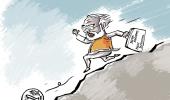'The current budgetary practice of shifting expenditures off-balance sheet in order to be seen to be meeting fiscal targets should be discontinued; additional fiscal stimulus would be imprudent; individual income tax rates should not be cut; GST rates should not be raised now,' advise Arvind Subramanian and Josh Felman.
Illustration: Uttam Ghosh/Rediff.com

In a recent paper, we set out a strategy for addressing what we called India's Great Slowdown.
The strategy aims at solving the balance sheet crisis by improving participants' incentives to resolve stressed assets.
It also aims at revitalising the real estate and power sectors by creating two bad banks.
And it calls for boosting confidence and trust, in part by improving data generation systems.
Call these measures the 'to-do list'.
Here we want to focus on several 'don'ts', especially fiscal stimulus via individual income tax cuts and boosting goods and services revenues by increasing tax rates.
These measures would not help India overcome the slowdown; they would instead make things worse.
Start with the proposal for a fiscal stimulus.
Ever since the global financial crisis, there has been a shift toward fiscal activism in advanced countries, as a way of boosting growth.
Some international economists have urged India to join this trend, while some domestic economists have asked, 'If they can do it, why can't we?'
The answer is that India is in a very different position than advanced countries.
In India, the space for fiscal stimulus simply doesn't exist.
The government is starting from a weak fiscal situation, much weaker and deteriorating more rapidly than the headline figures suggest.
As has been noted by several observers, and implied by the comptroller and auditor general's assessment, India's consolidated fiscal deficit was close to 9% of gross domestic product in 2018-2019.
This year's outcome will almost surely be worse.
In recent years, the government has been unable to reduce its debt-to-GDP ratio, despite rapid nominal GDP growth.
If growth remains low while the 'true' deficit reaches double digits, debt sustainability concerns will soon follow.
A key reason is that India has run into what might be called the (i-g) problem.
In advanced countries, the rate of interest for the government (i) is well below the rate of nominal growth (g).
If at the same time primary balances (revenues less non-interest expenditures) are small, then even large borrowings will not push up the debt/GDP ratio, because growth will increase the denominator faster than the accumulating interest will push up the numerator.
This is precisely why some advanced country economists support larger deficits.
But India is different.
Right now, the primary balance is in deficit and by much greater than suggested by the official deficit because all the off-balance sheet spending increases the primary deficit.
At the same time, interest rates on government securities exceed the nominal rate of growth (see chart).
As a result, large borrowing will make for deadly debt dynamics that India needs to steer clear of.
All of this would place constraints on fiscal expansion in normal times.
But these are not normal times.
There is a balance sheet crisis, and this crisis is placing even tighter constraints on the government's ability to issue debt.
The reason is that stressed banks have little appetite for government securities, since they need to be very careful about taking on assets that run the risk of generating losses.
Even government securities, which have (virtually) no default risk, can still generate losses because their prices fall when interest rates rise.

A large fiscal stimulus is precisely the wrong strategy for an economy where deficits are already large and interest rates are already too high relative to GDP growth.
Large additional government bond issues will put further upward pressure on government interest rates, which will push up corporate bond rates; and as companies then shift to borrowing from banks, this will push up bank lending rates as well.
Higher rates will then put further stress on the corporate and banking sectors, aggravating the balance sheet crisis.
Accordingly, fiscal stimulus will not help the economy.
It will only make things worse, by intensifying the vicious corporate stress-bank stress downward spiral.
If there is no scope for a large stimulus, what about providing a small boost by modestly reducing individual income taxes? This would also be unwise.
Tax cuts are easy to make, as they are politically popular.
But precisely for that reason they are very difficult to reverse.
And from a long-term point of view, it is far from obvious that fiscal resources should be devoted to favouring a small share of the population, who are by no means amongst the most deserving.
In fact, structurally, India should be thinking of ways to bring more taxpayers into the income tax net.
It should not be raising exemption limits, as was done unfortunately in the 2019-20 Budget.
Indeed, if the aim is to boost consumption, it is far better from an equity perspective to help people at the lower end of the income distribution than income tax payers who are at the very top end.
A modest direct benefit transfer to rural households along the lines we had proposed could be a way forward.
Expanding the government's PM-KISAN programme could be another.
Beyond these structural considerations, the scope for small income tax cuts is further constrained, because there is a large GST problem.
The growth in aggregate GST collections so far this fiscal year has only been about 3.5%, yet states want their guaranteed compensation of 14% growth.
And the compensation commitment is sacrosanct.
Should the GST rates then be increased?
Actually, no.
Consider how perverse it would be to think of cutting income tax cuts to boost consumption of the rich while raising GST rates on the other.
For example, raising the 5% rate would hit commodities that are consumed disproportionately by the poor -- that was the reason the rates were set low in the first place.
Moreover, the fact that space does not exist for additional stimulus does not imply that there should be active fiscal policy tightening, as this will only weaken already-enfeebled aggregate demand.
Without doubt, greater simplification of the rates is ultimately necessary along the lines that one of us had proposed: A lower rate of 8% to 10%, a standard rate around 12% to 14% and a higher rate of 40% for all demerit goods with no cesses and no multiplicity in the rates of cess.
But the time for these rate changes is not when the economy is in the midst of the Great Slowdown.
Rather, structural changes to the GST should be made once the economy recovers and these changes should be big and decisive enough to stop the ceaseless tinkering of rates that has taken place and contributed to policy uncertainty.
In the meantime, the commitment to the states should be funded by allowing the deficit to rise, modestly.
A final word on the GST.
Many commentators have argued that the poor collections this year reveal fundamental problems in the functioning and efficacy of the GST system.
Without doubt, the working of the system needs to be improved.
But we should be careful not to over-dramatise the problem.
Poor GST collections likely reflect a very weak economy -- much weaker than headline GDP numbers suggest -- combined with problems in the automotive sector, which is a major contributor to GST; and the impact of GST rate cuts in the second half of last fiscal year.
Summing up, there are (at least) five 'no's': First and foremost, the current budgetary practice of shifting expenditures off-balance sheet in order to be seen to be meeting fiscal targets should be discontinued; additional fiscal stimulus would be imprudent; individual income tax rates should not be cut; GST rates should not be raised now.
And we should not blame the GST when the root causes lie elsewhere.
The fault lies not in the GST, but in the weak state of the economy.
Arvind Subramanian, a former chief economic adviser to the Government of India, is a non-resident senior fellow at the Peterson Institute for International Economics. Josh Felman is director of JH Consulting.











